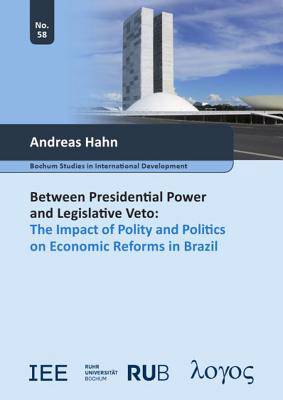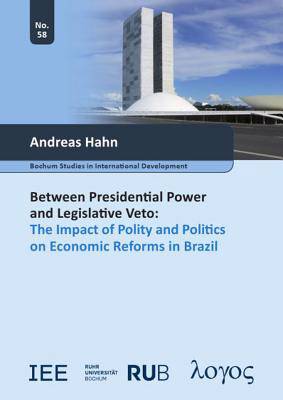
- Afhalen na 1 uur in een winkel met voorraad
- Gratis thuislevering in België vanaf € 30
- Ruim aanbod met 7 miljoen producten
- Afhalen na 1 uur in een winkel met voorraad
- Gratis thuislevering in België vanaf € 30
- Ruim aanbod met 7 miljoen producten
Zoeken
Between Presidential Power and Legislative Veto
The Impact of Polity and Politics on Economic Reforms in Brazil
Andreas Hahn
Paperback | Engels
€ 93,45
+ 186 punten
Omschrijving
Reform success and reform delay are subject to a variety of explanations. In general, high decisiveness leads to reform propensity, while its absence, or high resoluteness, to policy-gridlock. The Brazilian reform experience is contradicting: both aspects are present - factors leading to decisiveness as well as those inducing gridlock and reform delay. Leaving the static point of view and accounting for a dynamic development, this apparent contradiction gets resolved: in fact, the executive gained growing leeway during the 1990s, providing it with the means to achieve a higher degree of decisiveness of the political system by simultaneously guaranteeing resoluteness.It is, however, greatly mistaken to consider this development as a blank cheque to universal, encompassing reforming in all areas. Despite growing executive dominance and growing policy consensus, some particular reforms were a success, while others did not surpass its initial stages. This is finally due to path-dependency and explicit policy-specificities, triggering different institutional constraints and veto-points, which even strong Presidents cannot override.
Specificaties
Betrokkenen
- Auteur(s):
- Uitgeverij:
Inhoud
- Aantal bladzijden:
- 263
- Taal:
- Engels
Eigenschappen
- Productcode (EAN):
- 9783832525392
- Verschijningsdatum:
- 14/10/2010
- Uitvoering:
- Paperback
- Formaat:
- Trade paperback (VS)
- Afmetingen:
- 145 mm x 211 mm
- Gewicht:
- 339 g

Alleen bij Standaard Boekhandel
+ 186 punten op je klantenkaart van Standaard Boekhandel
Beoordelingen
We publiceren alleen reviews die voldoen aan de voorwaarden voor reviews. Bekijk onze voorwaarden voor reviews.








